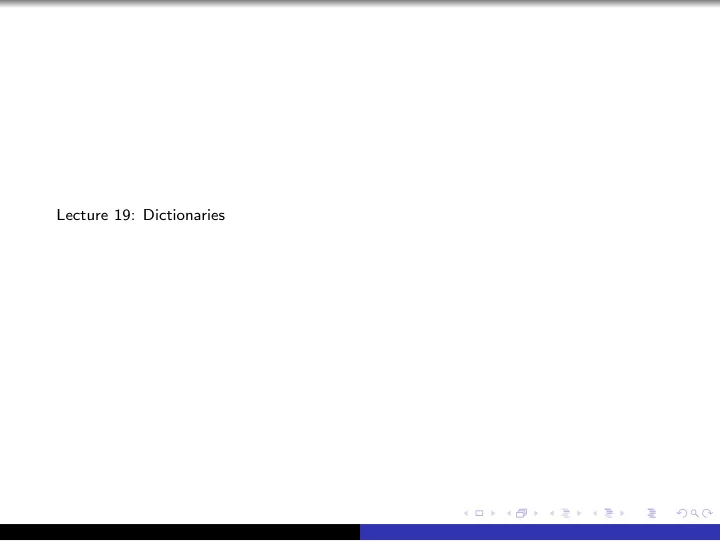

Lecture 19: Dictionaries
Counting Words Creating token from a text file: 1 def file to tokens(filename): 2 with open (filename) as fin: 3 return fin.read().split() Create token counts for each unique token: 1 def wc list(tokens): 2 uniq = [] 3 for token in tokens: 4 if token not in uniq: 5 uniq.append(token) 6 return [(t, tokens.count(t)) for t in uniq]
Profiling our Code >>> cProfile.run(’wc_list(first5000)’) 4575 function calls in 0.238 seconds Ordered by: standard name ncalls tottime percall cumtime percall filename:lineno(function) 1 0.000 0.000 0.238 0.238 <string>:1(<module>) 1 0.060 0.060 0.238 0.238 freq.py:12(wc_list) 1 0.001 0.001 0.177 0.177 freq.py:18(<listcomp>) 1 0.000 0.000 0.238 0.238 {built-in method builtins.exec} 2285 0.000 0.000 0.000 0.000 {method ’append’ of ’list’ objects} 2285 0.176 0.000 0.176 0.000 {method ’count’ of ’list’ objects} 1 0.000 0.000 0.000 0.000 {method ’disable’ of ’_lsprof.Profiler’
Quadratic versus Linear
Quadratic versus Linear
Counting Words 1 def wc dict(tokens): 2 counts = {} 3 for token in tokens: 4 if token in counts: 5 counts[token] += 1 6 else : 7 counts[token] = 1 8 return counts.items()
Practice: Building a Word Index Suppose we wanted to create an index of the positions of each token in the original text. Write a function called token locations that, when given a list of tokens, returns a dictionary where each key is a token and each value is list of indices where that token appears. >>> l = "brent sucks big rocks through a big straw".split() >>> print(token_locations(l)) {’big’: [2, 6], ’straw’: [7], ’brent’: [0], ’a’: [5], ’through’: [4], ’sucks’: [1], ’rocks’: [3]}
Recommend
More recommend